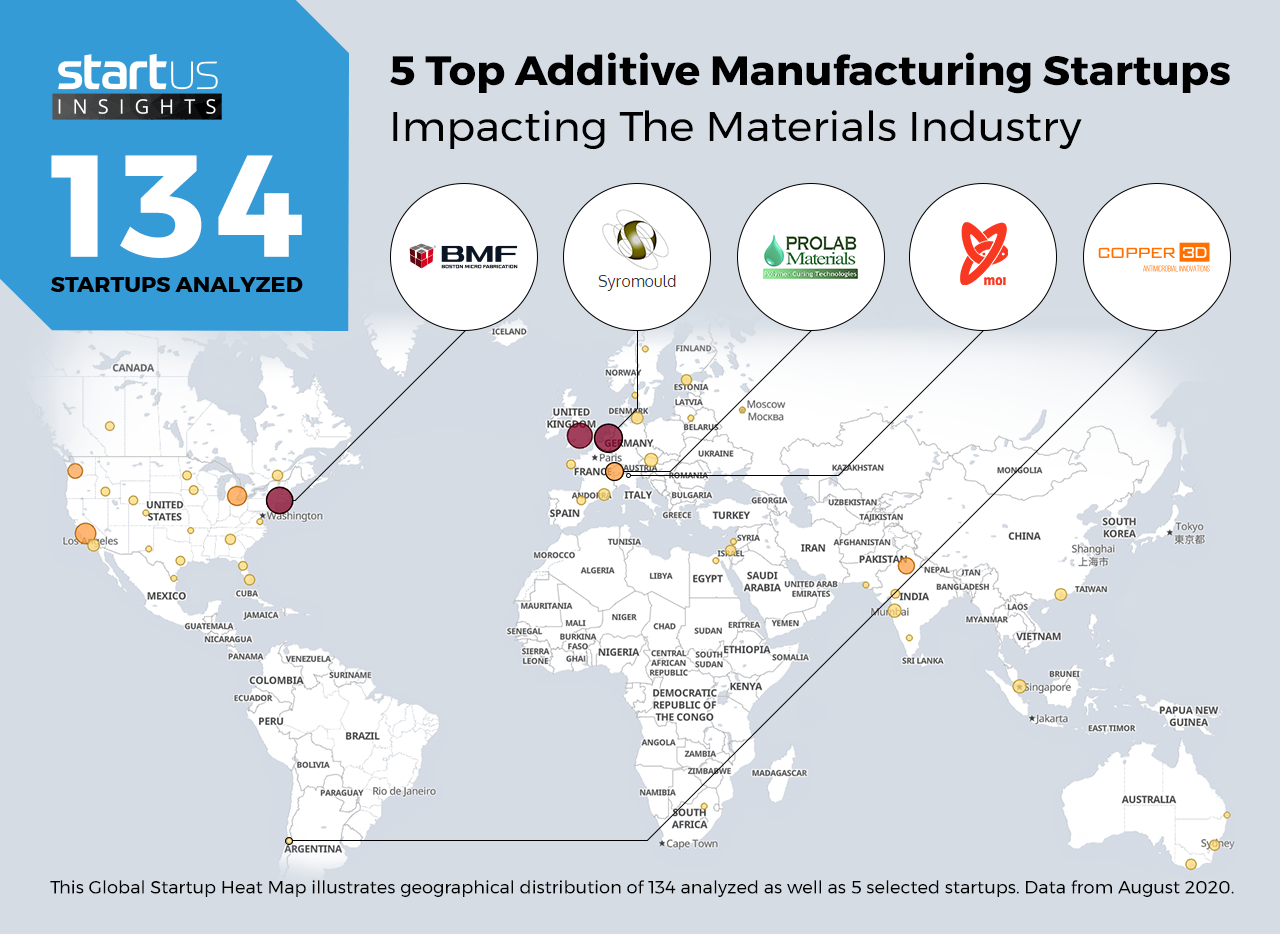Our Innovation Analysts recently looked into emerging technologies and up-and-coming startups working on solutions for the materials sector. As there is a large number of startups working on a wide variety of solutions, we want to share our insights with you. This time, we are taking a look at 5 promising additive manufacturing startups impacting the materials industry.
Heat Map: 5 Top Additive Manufacturing Startups Impacting The Materials Industry
Using our StartUs Insights Platform, covering 1.116.000+ startups & emerging companies, we looked at innovation in the field of materials. For this research, we identified 134 relevant solutions and picked 5 to showcase below. These companies are chosen based on a data-driven startup scouting approach, taking into account factors such as location, founding year, and relevance of technology, among others. Depending on your specific criteria, the top picks might look entirely different.
The Global Startup Heat Map below highlights 5 startups & emerging companies developing additive manufacturing material solutions. Moreover, the Heat Map reveals regions that observe a high startup activity and illustrates the geographic distribution of all 134 companies we analyzed for this specific topic.
ProLab Materials – Photopolymers
Mixing different polymer powders creates a wide range of structural and aesthetic materials that find applications in the aerospace, automotive, and manufacturing industries. The use of advanced polymers for additive manufacturing also enables 3D printing of structures without the support of a foundation. Startups develop photopolymers that react to ultraviolet (UV) light and solidify as a material solution for additive manufacturing.
Italian startup ProLab Materials creates custom photopolymers for 3D printing. The startup takes into account both the mechanical characteristics of the printed object and the constructive characteristics of the machine used in printing. Some customizable characteristics include reactivity to multiple stimuli, elasticity, and conductivity. These resins also enable the startup to use photolithographic techniques in additive manufacturing.
Copper3D – Antimicrobial Materials
Hospitals usually implement antimicrobial surfaces by using coatings and polymers that repel the growth of microbes. Copper and its alloys have natural antimicrobial properties, essentially boosting advanced polymer development. Innovations in material science encourage startups to leverage additive manufacturing techniques to provide 3D printed antimicrobial products.
Chilean startup Copper3D manufactures Plactive, a nanocomposite consisting of polylactic acid and nano-copper additives. This material exhibits thermoforming characteristics and facilitates post-processing and final adjustments of the 3D printed application. Plactive also exhibits antimicrobial properties that help surfaces eliminate the transmission of microbes. Plactive mainly has use cases in healthcare, particularly in 3D printing of post-operative prostheses, wound dressing, and surgical equipment.
Boston Micro Fabrication – Liquid Polymers
The microelectronics industry benefits from additive manufacturing as the production of components at the microscale becomes more efficient with the use of novel materials. Integrated circuits (IC) traditionally are manufactured in factories requiring labor and energy whereas additive manufacturing enables the 3D printing of microelectronics that is faster and efficiently uses resources with minimal waste.
The US-based startup Boston Micro Fabrication provides liquid polymers for micro injection molding. The startup uses projection micro stereolithography technology and liquid polymers to rapidly print micro-sized electronic components accurately and precisely. This technology eliminates tooling expenses involved in traditional 3D printing and also uses photopolymers.
Syromould – Granulated Polymers
Industrial 3D printing makes use of a wide variety of raw materials such as nylons, ceramics, metals, resins, and polymers. Binder jetting technology, stereolithography, and digital light processing use ceramics as raw material to 3D print products. This also encourages startups and emerging companies to offer new kinds of polymers that mimic or surpass the characteristics of ceramics.
Dutch startup Syromould develops a patented material Syroplast that exhibits characteristics of ceramics after 3D printing. This novel material is a highly filled polymer that is available as granular pellets. Both conventional injection molding printers and granulate-fed 3D printers are capable of using Syroplast. The physical characteristics of this material include high resistance to heat and incombustibility.
moi Composites – Thermoset Composites
Manufacturing components require parts to endure dynamic temperatures that sometimes turn extreme. Traditional fabrications are subject to wear and tear, require continuous monitoring, as well as periodic replacement. Additive manufacturing enables the printing of machine parts with thermoset polymers and composites that are capable of withstanding high temperatures.
Italian startup moi Composites deliver additive manufacturing solutions with the help of an advanced thermosetting composite material. The startup 3D prints fibers of various sizes in addition to different resins by combining various chemical and physical characteristics. With the help of industrial robots, the startup also enables scalability in terms of increasing the number of axis gantry machines to reach wider movement freedom.
What About The Other 129 Solutions?
While we believe data is key to creating insights it can be easy to be overwhelmed by it. Our ambition is to create a comprehensive overview and provide actionable innovation intelligence that enables you to achieve your goals faster. The 5 additive manufacturing startups showcased above are promising examples out of 134 we analyzed for this article. To identify the most relevant solutions based on your specific criteria, get in touch.









